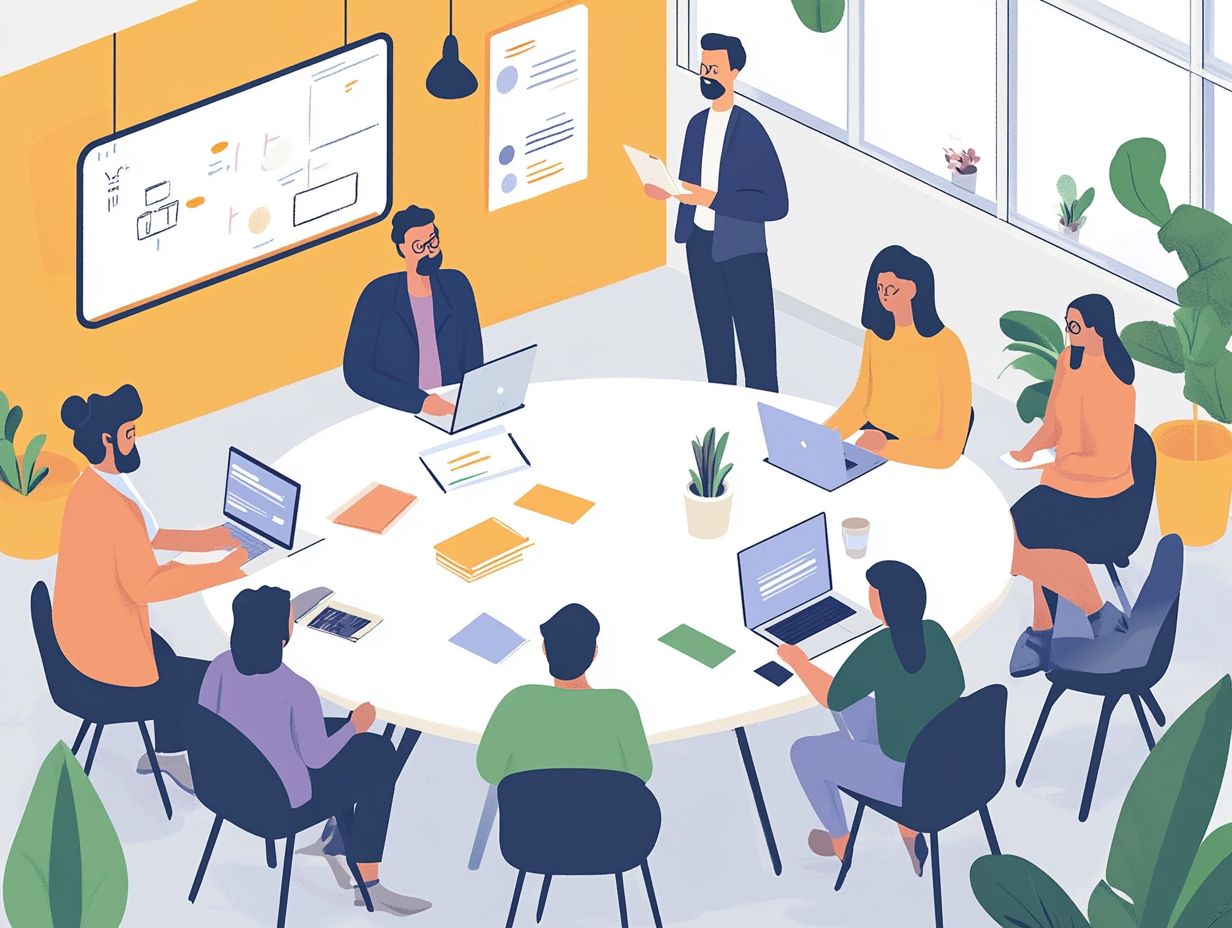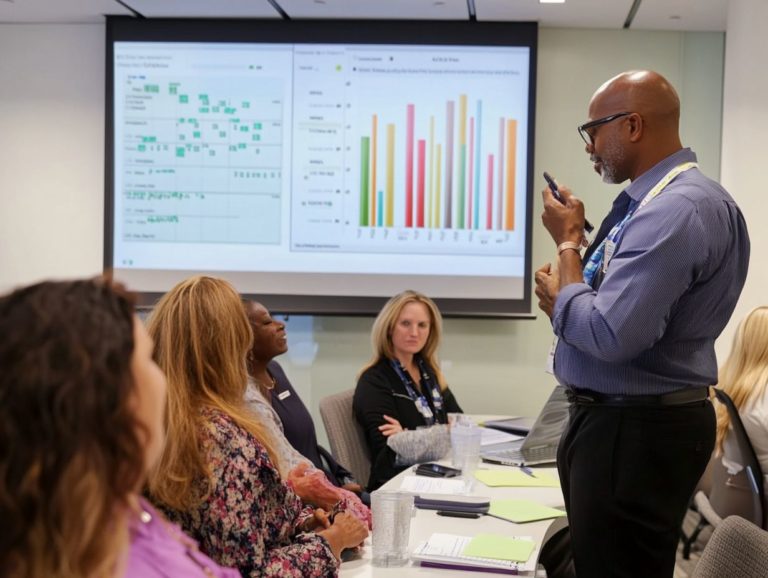7 Skills Every Employee Should Master
In today’s ever-evolving workplace, mastering key skills can profoundly influence your career trajectory. Discover how sharpening these essential skills can unlock your path to success!
This article delves into seven essential skills time management, communication, problem-solving, adaptability, teamwork, leadership, and continuous learning that not only enhance your individual performance but also contribute to a vibrant work environment.
You’ll discover how these competencies can elevate your career, explore effective ways to sharpen them, and understand the crucial role employers play in supporting your growth.
We ll also explore the implications of lacking these skills and what the future may hold for them in the professional landscape.
Contents
- Key Takeaways:
- 1. Time Management
- 2. Communication
- 3. Problem Solving
- 4. Adaptability
- 5. Teamwork
- 6. Leadership
- 7. Continuous Learning
- How Can These Skills Benefit an Employee in Their Career?
- Frequently Asked Questions
- Wondering what skills can set you apart? Here are the 7 essential skills every employee should master!
- How can mastering communication benefit an employee?
- Why is time management a necessary skill for employees to have?
- What does adaptability mean in the context of employee skills?
- How can critical thinking help an employee succeed in their job?
- What are some ways employees can develop their leadership skills?
Key Takeaways:

- Prioritize tasks with effective time management to meet deadlines and maintain balance.
- Build relationships and resolve conflicts through strong communication skills.
- Analyze situations and develop creative solutions with strong problem-solving skills.
1. Time Management
Effective time management is an essential skill that enhances your job performance and productivity. In today s fast-paced work environments, where remote work and multitasking are standard, allocating your time wisely is key.
When you manage your time effectively, you boost your own efficiency and contribute to the overall success of your team. Organizations are acknowledging the importance of this capability and are offering resources specifically designed to enhance your time management skills.
For instance, prestigious institutions like Harvard Business School provide online courses accessible to anyone interested in improving their skills. These courses equip you with practical strategies to manage your schedule more effectively. Digital tools, such as questionnaires, help you identify your time management strengths and weaknesses.
When combined with emotional intelligence your ability to understand and manage your emotions mastering this skill is vital for achieving your professional goals and fostering a more productive workplace.
Start today by prioritizing your tasks and utilizing digital tools to enhance your efficiency.
2. Communication
Strong communication skills are essential for fostering employee engagement and driving organizational leadership. They facilitate seamless interactions, whether in person or remotely.
When you articulate your ideas clearly and understand others’ perspectives, you create an environment where teamwork thrives and collaboration feels effortless. Effective communication connects diverse team members, helping them work together toward shared objectives.
To elevate these crucial skills, organizations can implement targeted training programs focusing on negotiation techniques and active listening practices. By creating opportunities for learning and development, management enables you to refine your communication abilities, cultivating a culture of openness and trust that significantly enhances productivity and satisfaction throughout the organization.
Consider seeking out training or workshops to sharpen your communication skills further.
3. Problem Solving
Problem-solving skills are invaluable in today s dynamically changing work environment, enabling you to navigate challenges with critical thinking and strategic analysis.
These skills promote your personal growth and enhance team cohesion, driving organizational success. Equipped with strong problem-solving abilities, you become adept at analyzing data, spotting patterns, and implementing effective solutions, even under pressure.
Engaging in methodologies like analytics and crisis management training can elevate these essential skills, providing practical frameworks to tackle complex scenarios.
Strong problem-solving skills lead to better job performance and a resilient workplace culture, allowing teams to thrive even in uncertainty.
Take the initiative to practice problem-solving techniques in everyday situations to enhance these skills.
4. Adaptability
Adaptability is an essential skill in the workplace. It helps you thrive amid change and fosters resilience and emotional intelligence during challenges.
In today’s rapidly evolving landscape, especially in the realm of remote work, this skill has become increasingly vital. Your ability to pivot and adjust to new technologies or shifting team dynamics can profoundly impact both productivity and morale.
Organizations recognize that continuous growth through learning is fundamental to cultivating adaptability. Platforms like TalentLMS provide a wealth of training programs designed to enhance a diverse array of skills.
These resources help you acquire new competencies and promote a mindset of lifelong learning, enabling your team to confront new challenges with confidence and flexibility.
5. Teamwork

Teamwork is vital! It sparks collaboration and boosts employee engagement, ultimately leading to superior outcomes in organizational leadership and project success.
When you and your teammates come together, you blend diverse skills and perspectives. This paves the way for a more innovative approach to tackling challenges.
Effective teamwork elevates morale and aligns individual contributions with the organization s broader strategic objectives. Embracing key practices like open communication, mutual respect, and clear goal-setting is essential for nurturing a strong team dynamic.
Strong leadership models the behaviors you wish to see, fostering a culture where collaboration flourishes. This approach enables your organization to respond nimbly to challenges and seize emerging opportunities with confidence.
6. Leadership
Leadership is a skill that involves many aspects, blending planning for the future, emotional intelligence, and the ability to inspire and engage employees in the pursuit of organizational goals.
Creating a collaborative environment where team members feel valued and enabled to share their ideas is significant. Effective leaders adapt their communication styles to different audiences, ensuring clarity and understanding.
Leadership isn t just an innate trait; it can be cultivated through targeted training programs. Renowned institutions like Harvard Business School and TalentLibrary offer courses specifically designed to equip you with the essential tools to enhance your leadership potential.
This underscores the vital role of ongoing education in shaping capable and effective leaders.
7. Continuous Learning
In today s fast-paced world, continuous learning isn t just important; it s essential for your career. It allows you to acquire in-demand skills and propel your career forward through professional development opportunities.
By adopting a culture of lifelong learning, your organization boosts its workforce’s capabilities and fosters innovation and adaptability. This proactive approach ensures you remain relevant in an increasingly competitive job market.
Resources like online courses and learning management systems which are online platforms that help you learn new skills offer accessible pathways for skill enhancement. This enables you to customize your learning experiences to align with your unique career aspirations.
These platforms typically provide a rich array of modules across diverse fields. This focus on continuous learning is vital for both your personal advancement and the overall growth of your organization.
How Can These Skills Benefit an Employee in Their Career?
Developing essential workplace skills can significantly enhance your career, improving not only your job performance but also your prospects for advancement and fulfillment.
For example, when you excel in emotional intelligence, you become better equipped to manage workplace relationships. You ll navigate conflicts with ease and build strong networks that can open doors to collaborative opportunities.
Problem-solving skills are equally crucial; if you can creatively tackle challenges, you ll stand out and position yourself as a leader capable of driving projects forward, potentially earning those coveted promotions.
Your ability to work effectively in teams fosters an environment of support and shared goals, elevating job satisfaction to new heights. When you contribute to successful initiatives, you enhance your own resume while also nurturing a positive workplace culture that benefits everyone involved.
What Are Some Ways to Improve These Skills?
Improving your key workplace skills can be accomplished through various methods, including targeted employee training programs and engaging online courses that make learning a seamless experience.
One effective approach is to leverage online platforms like TalentLMS, which offer a diverse range of courses specifically designed to enhance your professional skills. These resources allow you to learn at your own pace while providing access to expert insights and interactive content that keeps you engaged.
By incorporating learning management systems digital platforms that help you manage your learning process into your routine, you can track your progress and ensure that the training translates effectively into your work.
By consistently dedicating time to skill development and utilizing these amazing tools, you can create a habit of always learning around you, ultimately boosting productivity and enhancing overall workplace performance.
How Can Employers Help Their Employees Develop These Skills?

Employers hold a crucial position in your development as an employee, offering resources and training programs that cultivate essential workplace skills and elevate your overall job performance.
By actively investing in your growth, they not only enhance your individual capabilities but also elevate team morale and improve organizational effectiveness. This investment often includes tools like online courses, workshops, and mentorship opportunities designed to accommodate diverse learning styles.
Creating a supportive environment where you feel encouraged to seek out learning experiences can greatly enhance a culture of continuous improvement. Employers should recognize what you need to grow and thrive, tailoring development initiatives that align with your personal aspirations as well as the company s objectives.
What Are the Consequences of Not Having These Skills in the Workplace?
The absence of essential workplace skills can lead to significant consequences for you and your organization, including diminished job performance, decreased employee engagement, and impaired leadership effectiveness.
When you lack critical competencies, the ripple effects can severely undermine your team s cohesion and overall morale. You may find yourself struggling with basic tasks, which leads to frustration and a lack of confidence, ultimately affecting collaboration and communication.
This skills gap not only hampers your personal growth but also limits your team s collective ability to innovate and achieve objectives. Without these skills, you could quickly fall behind your peers and miss out on exciting opportunities!
As a result, your organization may experience a decline in productivity, with resources wasted on fixing avoidable errors and valuable time lost that could have been spent advancing important goals.
How Do These Skills Contribute to a Positive Work Environment?
Essential workplace skills play a pivotal role in creating a positive work environment, significantly enhancing teamwork, emotional intelligence (the ability to understand and manage your own emotions and those of others), and employee engagement.
When you develop these vital skills, you elevate your ability to communicate clearly and resolve conflicts with finesse. You also learn to adapt smoothly to changes. For instance, strong leadership within your organization can spark initiative among team members, enabling them to share their ideas openly and feel valued.
Effective teamwork, marked by open dialogue and mutual support, fosters collaboration on projects. This paves the way for innovative solutions.
These dynamics not only uplift morale but also drive productivity, crafting a workplace where everyone is inspired to pursue common goals and celebrate each other’s successes.
What Are the Future Trends for These Skills in the Workplace?
As the workplace continues to evolve, you ll discover that future trends will increasingly spotlight an increasing demand for essential skills like emotional intelligence, adaptability, and digital proficiency to tackle emerging challenges.
These skills are not just vital for your personal success; they are also key in fostering innovation, particularly as remote work becomes the norm. By embracing ongoing professional development, you ll be better equipped to navigate the complexities of digital tools and virtual communication.
Now is the time to invest your time in training that hones both technical capabilities and soft skills. This will significantly enhance your ability to make meaningful contributions to your organization.
Employers also play a crucial role in this growth journey. By cultivating inclusive learning environments that promote continuous skill enhancement, they can ensure that you and your colleagues remain competitive in the face of rapid technological advancements.
Frequently Asked Questions
Wondering what skills can set you apart? Here are the 7 essential skills every employee should master!

The 7 essential skills every employee should master are communication, time management, adaptability, critical thinking, teamwork, leadership, and problem-solving.
How can mastering communication benefit an employee?
Effective communication is crucial in the workplace as it helps employees build relationships, resolve conflicts, and convey ideas clearly. It also leads to better teamwork and productivity.
Why is time management a necessary skill for employees to have?
Time management allows employees to prioritize tasks, meet deadlines, and maintain a healthy work-life balance. It also demonstrates reliability and responsibility, which are valued traits in the workplace.
What does adaptability mean in the context of employee skills?
Adaptability refers to an employee’s ability to adjust to changing situations and environments. This skill is essential in today’s fast-paced and ever-evolving work environment.
How can critical thinking help an employee succeed in their job?
Critical thinking involves analyzing and evaluating information to make informed decisions. It allows employees to solve problems creatively and make sound judgments, ultimately leading to better job performance.
What are some ways employees can develop their leadership skills?
Employees can develop their leadership skills by taking on new challenges, seeking feedback from colleagues and mentors, and continuously learning and growing. Joining leadership training programs or workshops can also be helpful.






